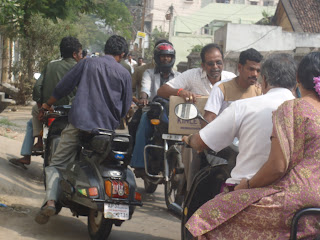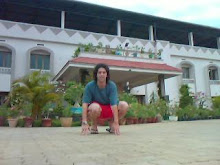The film Water of Indian director DEEPA MEHTA, is an intimate, tender and hard story on the banks of the Ganges river, marked by the presence of the Hindu widows who live recruited and with all kinds of deprivations.
In the year 2000, after obtaining all the necessary permissions and the approval of the script on the part of the government of India, the actors and the equipment engineer traveled to Varanasi to begin the Water running. Two days after began to roll, violent protests were carried out by fundamentalists.
The film was pointed to go against the Hindu religion, the scenery was destroyed and thrown to the river, and the manifestations followed one another in the streets of Varanasi. Before the increasing protests and threats, the running had to be suspended.
The project took four years in returning to start up, this time in Sri Lanka where among others things, were necessary to change the distribution completely. After rolling several films on the Indian society (“Fire”, “Earth”), Deepa Mehta became person “non grata” in her country to have taught to the world pictures rejected by the Indian culture.
D. Mehta attacks against the religion that arouses ignorance. Chuyia is eight years old. She is in the age about which other girls just think about playing and, nevertheless, she is already widow. And, still worse, in the India of 1938, place and time in which the story is taken, Chuyia´s life is worth nothing.
Until she dies, according with the Hindu belief, she will remain shut in “ashram”, a kind of gloomy gynecological place appointed for widows, and she will have to beg or, still, to prostitute herself to survive.
Deepa Metha (Amristar, 1950), the solid director and Indian scriptwriter who lives in Canada has resorted to this character to denounce forcefully the religious fundamentalism.
In Water - film with which the film director concludes her trilogy initiated with Fire and continued with Earth censures which she names "the promotion of ignorance" through the religions. At present, Deepha Metha explains, there are in India more than 34 million widows, which 11 million live in ashrams in the middle of an absolute misery.
But not everything remains the same in India. For example, she says, the marriages of grown-ups people with children today are prohibited. The drama of Chuyia, therefore, at the moment continues being feasible, but the main character would have to be elder.
Deepa Mehta´s watching is one of the greater social commitments and jeopardize of the new Indian cinema. She complains that, in spite of the social policies and mainly to the work "on the spot", of nongovernmental organizations activists, execrable traditions as locking the widows up still remain.
"The problem, according to my point of view" she says, is based at woman itself. They agree on these customs because they think that if they did not do it they would betray sacred texts, would apostatize of her religion".
The film director, nevertheless, wants damages to circumscribe it of the integrism neither to his country, nor to Hinduism. "Anywhere in the world” , this director says whose work has been praised by Salman Rushdie, "still being much dependency of the religions”.
“It would be enough, she tells, have a look at what is happening in the United States with the Christian fundamentalism. In my opinion, the great religions of the world badly have been interpreted, which leads to reactions that, personally, scare to me a lot”.
The same intolerance that took to fundamentalist groups to boycott the Fire projections in Bombay and in New Delhi, in 1998, because the movie turned on a homosexual relation between two women, it lead to radical religious groups of Benares to obstruct, in the 2000, the Water running - that finally was released in India at the end of 2006. As much that there was to be postponed it.
Four years later, Deepa Mehta could film the movie, but in Sri Lanka, with a different distribution, in which professional actors with newcomer mix themselves. About the actors we could emphasize "the skill and talent" of the infantile actress, the Sarala Ceylonese, of Seema Biswas - "a great lady of the scene india" - and of John Abraham, star of Bollywood.
Water, a beautiful approaching to indian´s women in a very sad context.
In the year 2000, after obtaining all the necessary permissions and the approval of the script on the part of the government of India, the actors and the equipment engineer traveled to Varanasi to begin the Water running. Two days after began to roll, violent protests were carried out by fundamentalists.
The film was pointed to go against the Hindu religion, the scenery was destroyed and thrown to the river, and the manifestations followed one another in the streets of Varanasi. Before the increasing protests and threats, the running had to be suspended.
The project took four years in returning to start up, this time in Sri Lanka where among others things, were necessary to change the distribution completely. After rolling several films on the Indian society (“Fire”, “Earth”), Deepa Mehta became person “non grata” in her country to have taught to the world pictures rejected by the Indian culture.
D. Mehta attacks against the religion that arouses ignorance. Chuyia is eight years old. She is in the age about which other girls just think about playing and, nevertheless, she is already widow. And, still worse, in the India of 1938, place and time in which the story is taken, Chuyia´s life is worth nothing.
Until she dies, according with the Hindu belief, she will remain shut in “ashram”, a kind of gloomy gynecological place appointed for widows, and she will have to beg or, still, to prostitute herself to survive.
Deepa Metha (Amristar, 1950), the solid director and Indian scriptwriter who lives in Canada has resorted to this character to denounce forcefully the religious fundamentalism.
In Water - film with which the film director concludes her trilogy initiated with Fire and continued with Earth censures which she names "the promotion of ignorance" through the religions. At present, Deepha Metha explains, there are in India more than 34 million widows, which 11 million live in ashrams in the middle of an absolute misery.
But not everything remains the same in India. For example, she says, the marriages of grown-ups people with children today are prohibited. The drama of Chuyia, therefore, at the moment continues being feasible, but the main character would have to be elder.
Deepa Mehta´s watching is one of the greater social commitments and jeopardize of the new Indian cinema. She complains that, in spite of the social policies and mainly to the work "on the spot", of nongovernmental organizations activists, execrable traditions as locking the widows up still remain.
"The problem, according to my point of view" she says, is based at woman itself. They agree on these customs because they think that if they did not do it they would betray sacred texts, would apostatize of her religion".
The film director, nevertheless, wants damages to circumscribe it of the integrism neither to his country, nor to Hinduism. "Anywhere in the world” , this director says whose work has been praised by Salman Rushdie, "still being much dependency of the religions”.
“It would be enough, she tells, have a look at what is happening in the United States with the Christian fundamentalism. In my opinion, the great religions of the world badly have been interpreted, which leads to reactions that, personally, scare to me a lot”.
The same intolerance that took to fundamentalist groups to boycott the Fire projections in Bombay and in New Delhi, in 1998, because the movie turned on a homosexual relation between two women, it lead to radical religious groups of Benares to obstruct, in the 2000, the Water running - that finally was released in India at the end of 2006. As much that there was to be postponed it.
Four years later, Deepa Mehta could film the movie, but in Sri Lanka, with a different distribution, in which professional actors with newcomer mix themselves. About the actors we could emphasize "the skill and talent" of the infantile actress, the Sarala Ceylonese, of Seema Biswas - "a great lady of the scene india" - and of John Abraham, star of Bollywood.
Water, a beautiful approaching to indian´s women in a very sad context.

